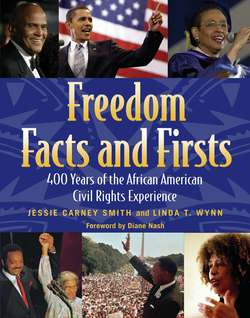Читать книгу Freedom Facts and Firsts - Jessie Carney Smith - Страница 112
На сайте Литреса книга снята с продажи.
Race Consciousness Black Pride
ОглавлениеBlack Pride is an important concept in the struggle for freedom and civil rights, for it cannot exist without this belief. Since one tactic in the oppression of black people is to provide them with a negative sense of self-worth, the emergence of black pride fosters an urgency that serves as a catalyst or undercurrent for the struggle for equality. Black pride was a phrase that was popular during the Civil Rights Movement of the 1960s, but it is not limited to this period. It was a part of the thrust of educators and orators like Maria Stewart, Frances Ellen Watkins Harper, Sojourner Truth, and Anna J. Cooper, women who spoke in support of equality and fought for better treatment. Those who argued for a return to a homeland—nationalists and separatists—believed that there could be no equal treatment for men of color. Among adherents to this belief were Henry Highland Garnet, Alexander Crummell, Martin Delany, Marcus Garvey, and Malcolm X. Garvey encouraged pride in race and the beauty of black people, while Malcolm X preached independence and separatism. Even a personality like Booker T. Washington, who is often viewed as a conservative, said in Up From Slavery that he would rather be a member of the Negro race than any other. This celebration of self and of heritage is evident in the practice of changing one’s name; following the emancipation, and especially during the 1970s, many black people changed their names to ones they felt were more reflective of their identity and freedom. Black pride is also in evidence in music, such as in James Brown’s “Say It Loud, I’m Black and I’m Proud.”
Helen R. Houston
